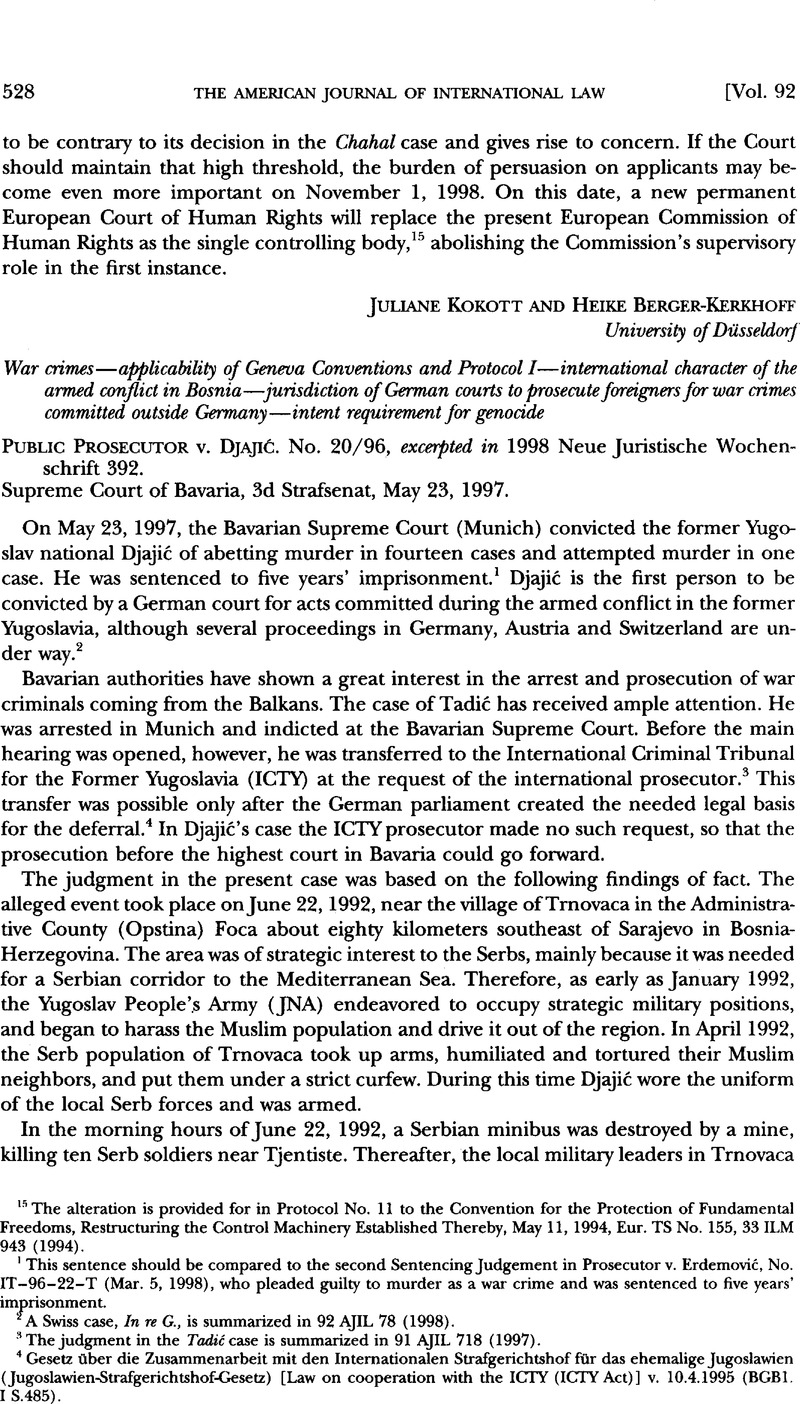Article contents
Public Prosecutor v. Djajic. No. 20/96
Published online by Cambridge University Press: 27 February 2017
Abstract

- Type
- International Decisions
- Information
- Copyright
- Copyright © American Society of International Law 1998
References
1 This sentence should be compared to the second Sentencing Judgement in Prosecutor v. Erdemović, No. IT–96–22–T (Mar. 5, 1998), who pleaded guilty to murder as a war crime and was sentenced to five years’ imprisonment.
2 A Swiss case, In re G., is summarized in 92 AJIL 78 (1998).
3 The judgment in the Tadić case is summarized in 91 AJIL 718 (1997).
4 Gesetz über die Zusammenarbeit mit den Internationalen Strafgerichtshof für das ehemalige Jugoslawien (Jugoslawien-Strafgerichtshof-Gesetz) [Law on cooperation with the ICTY (ICTY Act)] v. 10.4.1995 (BGB1. IS.485).
5 Murder is punishable under §211 Strafgesetzbuch [StGB] (German Penal Code).
6 Punishable according to §27 StGB.
7 Sec. 212 StGB.
8 Dec. 9, 1948, 78 UNTS 277.
9 See, e.g., the passages in Trial Chamber I’s Rule 61 decisions in Prosecutor v. Karadzić and Mladić, Nos. IT–95–5–R61 & IT–95–18–R61, paras. 92–95 (July 11, 1996), and Prosecutor v. Nikolić, No. I T–9 4–2–R61, para. 34 (Oct. 20, 1995), 108 ILR 85, 21, respectively. The chamber speaks of “aggravated intent.”
10 Sec. 220a StGB.
11 Sec. 6 Nr. 9 StGB.
12 See Dietrich Oehler, Internationales Strafrecht 519, Nos. 844–907 (2d ed. 1983).
13 Sec. 7(2) StGB. See Oehler, supra note 12, at 497, Nos. 802–43. As the act was punishable under both Yugoslav and Bosnian law and Bosnia had expressed no interest in extradition, the conditions of this principle were met.
14 Convention Relative to the Protection of Civilian Persons in Time of War, Aug. 12, 1949, 6 UST 3516, 75 UNTS 287.
15 Protocol Additional to the Geneva Conventions of 12 August 1949, and Relating to the Protection of Victims of International Armed Conflicts, Dec. 12, 1977, 1125 UNTS 3.
16 In the case of Bosnia-Herzegovina, this was on March 6, 1992. The newly independent states on the territory of the former Yugoslavia accepted their obligations as regards humanitarian treaty law with alacrity.
17 Vienna Convention on Succession of States in Respect of Treaties, Aug. 22, 1978, UN Doc. A/CONF.80/ 31, 17 ILM 1488 (1978).
18 On the ratification list given by the International Committee of the Red Cross (ICRC), Bosnia appears to have succeeded to the Geneva Conventions and Protocol I on December 31, 1992.
19 That the court emphasized the declaration of independence as the relevant date conflicts with other views. See, e.g., Theodor, Meron, War Crimes in Yugoslavia and the Development of International Law , 88 AJIL 78, 81 (1994)Google Scholar (listing the relevant factors as recognition by foreign states, the admission of the new states to the United Nations and agreements between these parties and the ICRC).
20 In particular, the question of internal-international conflict has provoked difficulties. While the Croatian presence in Bosnia was considered tantamount to making the conflict international in character, see Prosecutor v. Rajić, No. IT–95–12–R61, Rule 61 Decision, para. 13 (Sept. 13, 1996), 108 ILR 141, the Serb influence was considered as falling short of this threshold, see Prosecutor v. Tadić, No. IT–94–1–T, Judgment, paras. 578–608 (May 7, 1997), 112 ILR (forthcoming).
21 Prosecutor v. Tadić, No. IT–94–1–AR72, Appeal on Jurisdiction, paras. 46–52 (Oct. 2, 1995), 105 ILR 419, 35 ILM 32 (1996).
22 Tadić, No. IT–94–1–T, supra note 20, paras. 606–68.
23 Prosecutor v. Gagović, No. IT–96–23–I, Confirmation of the Indictment, para 4.1 (June 26, 1996).
24 See Greenwood, C., International Criminal Law and the Tadić Case , 7 Eur. J. Int’l L. 265 (1996)Google Scholar.
25 The judges did so without giving further references. Public international law is not per se applicable in German law. According to Article 25 of the Grundgesetz (Basic Law), public international law prevails over ordinary, that is, nonconstitutional, national law, but only as concerns general principles (allgemeine Regeln des Völkerrechts). Treaties, on the other hand, are directly applicable in German law only insofar as they embody commonly accepted international norms, that is, rules that are recognized as binding by a large majority of states, especially those particularly affected.
26 This argument stems from the teaching of the aims and purposes of criminal law. In Germany the arguably prevailing theory of positive general prevention has as one of its main pillars the idea of promoting a sense of reliability in the legal system. See, e.g., Günther Jakobs, Strafrecht, Allgemeiner Teil, pt. 1, No. 4 (2d ed. 1991); and Claus Roxin, Strafrecht, Allgemeiner Teil, pt. 1, §3, No. 27 (3d ed. 1997).
27 The main hearing started on February 5, 1997, and lasted until May 23, 1997.
- 3
- Cited by


